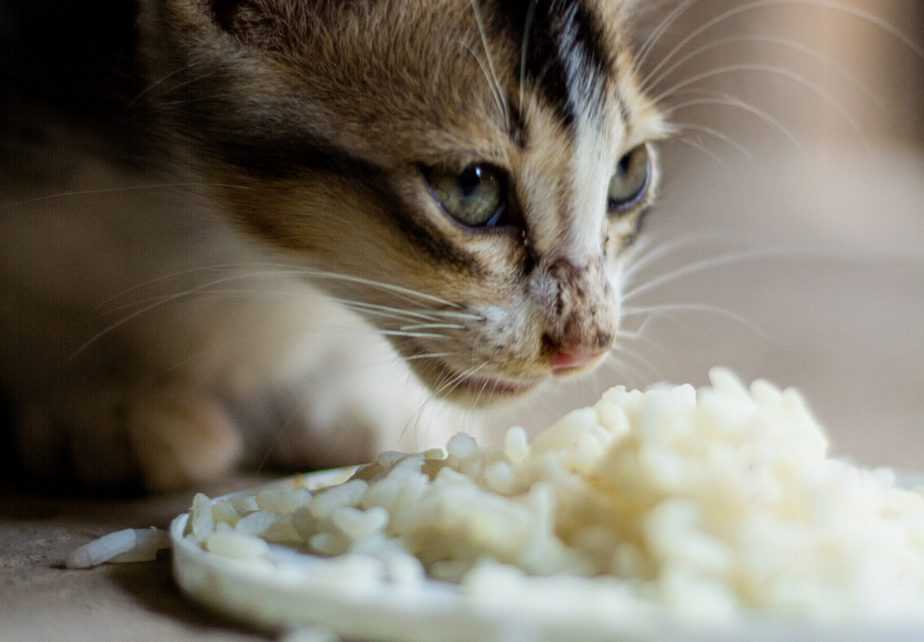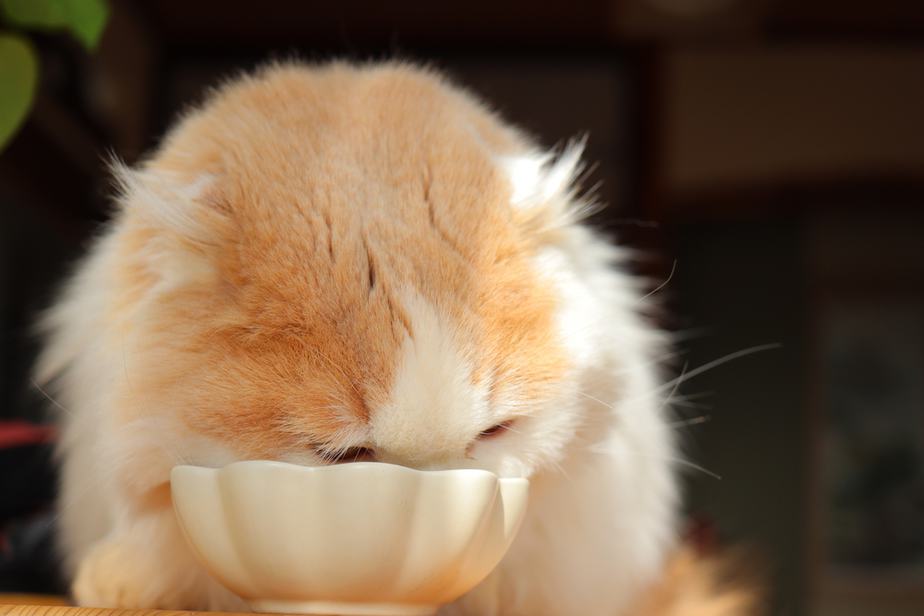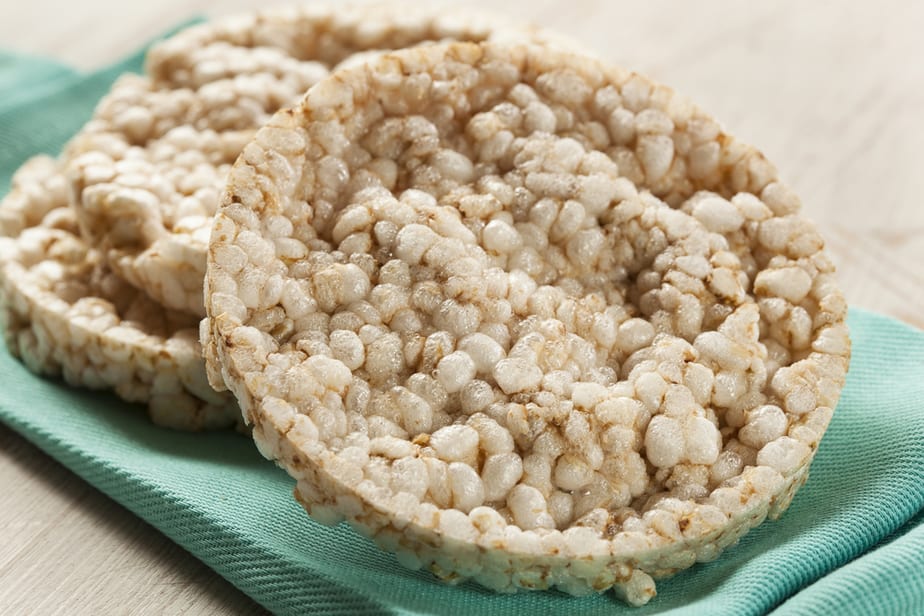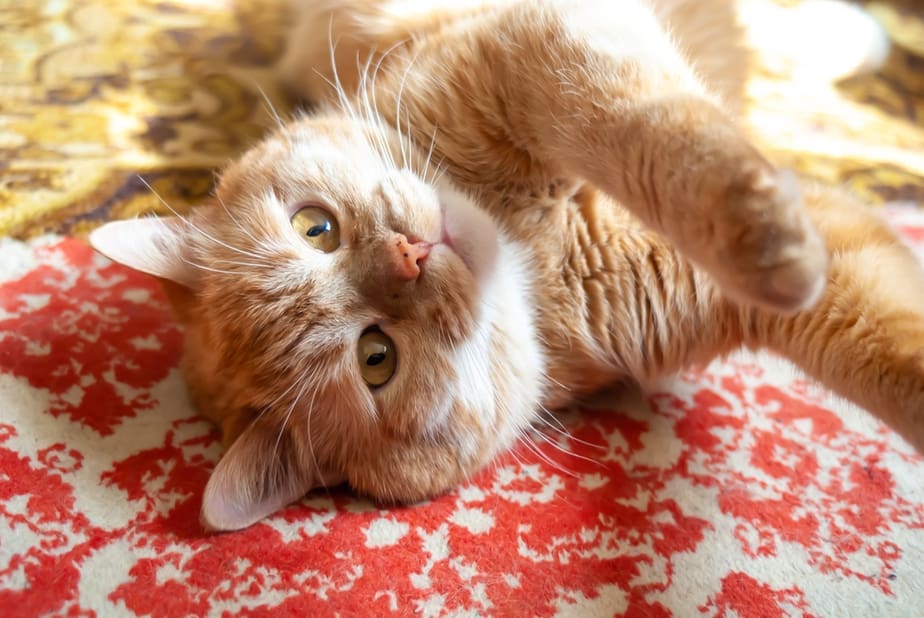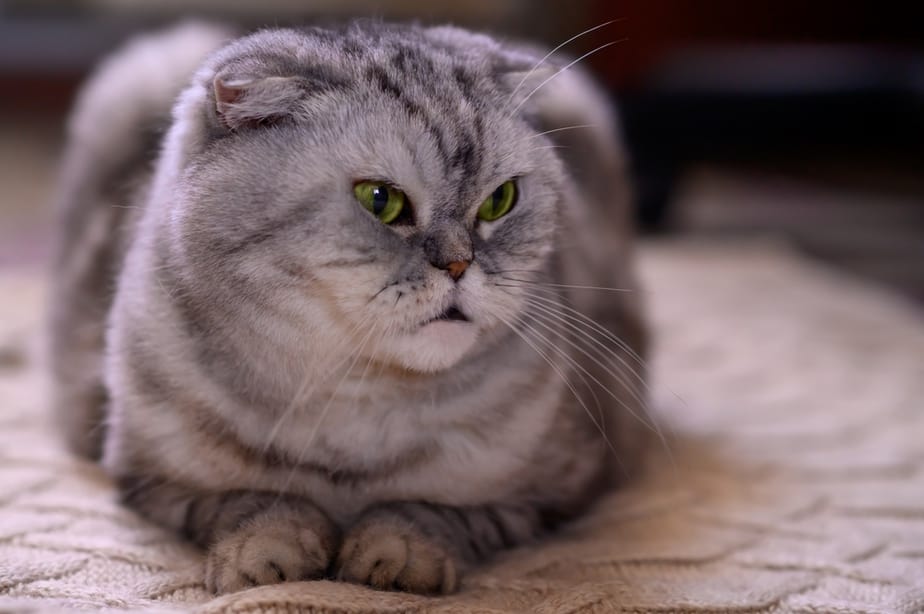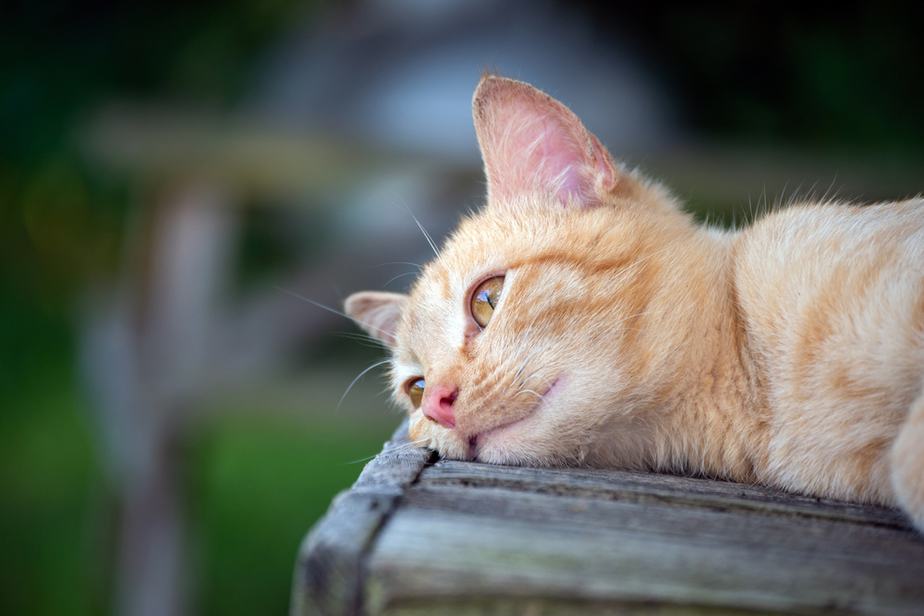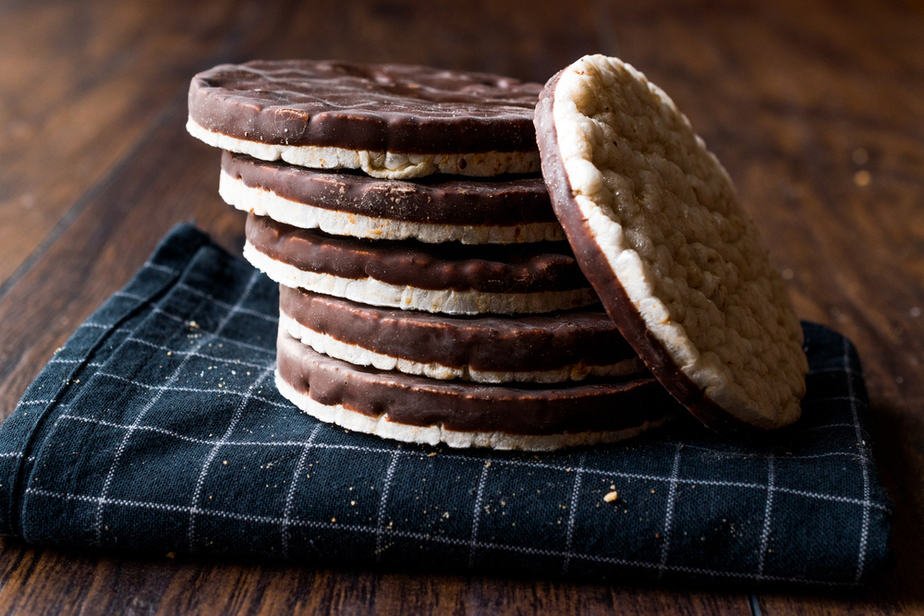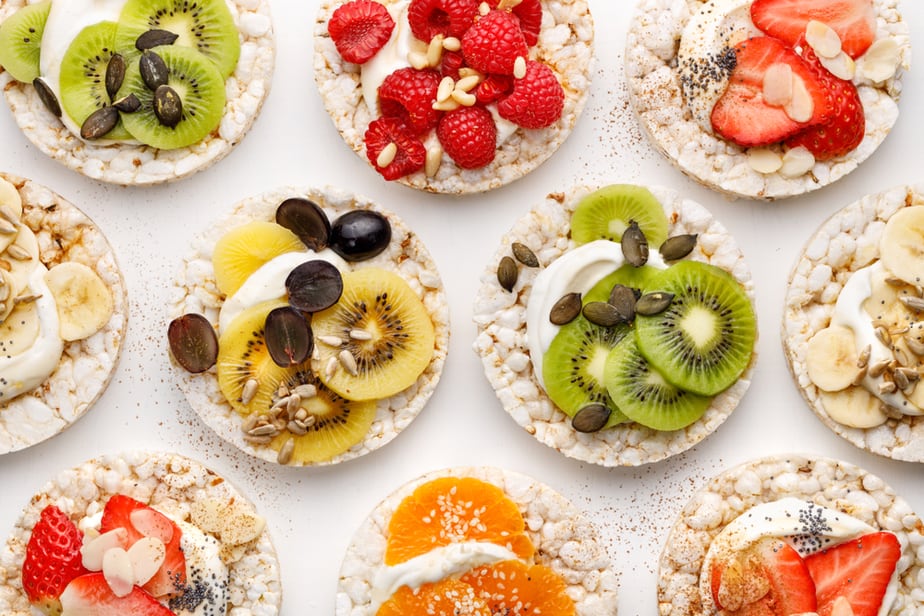📖 Table of Content:
- Can cats eat rice?
- If cats can eat rice, can they eat rice cakes?
- Why you shouldn’t feed rice cakes to your cat
- Are there any reasons a cat should eat rice cakes?
- Can cats eat brown rice cakes?
- Can cats eat chocolate rice cakes?
- Can cats eat cinnamon rice cakes?
- Can cats eat rice cakes with fruit?
- Cats can eat rice cakes, but…
”I absolutely love making yummy rice cake stacks but my cat won’t leave me alone as soon as she sees me open the bag! Don’t get me wrong, I don’t mind sharing but I have no idea whether they’re a safe treat? Can cats eat rice cakes?”
These crunchy snacks have been all the rage in the past couple of years! If you decided to finally embark on your fitness journey, chances are you purchased an entire stash of rice cakes. They’ve been featured on pretty much every TikTok fitness influencer’s page!
They’re incredibly light, neutral in flavor, and low in calories. They go well with everything, sweet or savory. Avocado and chili flakes, cucumber and hummus, peanut butter and banana – the variety of delicious toppings are virtually endless.
It’s no wonder your feline friend has been showing a sudden interest in these mouth-watering morsels. After all, she sees you wolf them down every morning for breakfast. She’s probably thinking to herself ”Mom seems obsessed with these odd-looking treats. I must have!”
So, can cats eat rice cakes? Technically yes, but they’re not a suitable treat for your feline friend. If you were planning on sharing your healthy snack with your cat, you might want to hold your horses for now.
To determine whether or not cats can eat rice cakes, let’s look at what goes in them (like rice, of course) – and more importantly – on them!
Can cats eat rice?
So, rice is the main ingredient in rice cakes. If you’re trying to figure out whether cats can eat these crunchy snacks, it’s only logical to take a closer look at this universally loved grain. Can cats eat rice?
The short answer would be – yes! Rice doesn’t contain anything toxic that might harm your precious pet. It even contains several vitamins and minerals that might benefit her in some way. Believe it or not, most commercially available cat food contains rice as its base ingredient!
While there are several different types, white and brown rice are the most popular among humans. They’re healthy, rich in vitamins and antioxidants, and make for a well-rounded diet. White rice has gotten quite a bad reputation in the past couple of years, but…
It’s all a bunch of mumbo jumbo! White rice is processed from brown rice. While it’s true that it loses some of its nutrients in this process, it also becomes enriched with other vitamins and minerals. Depending on your nutritional needs, white rice might even be healthier for you than brown!
But, there’s also a longer answer to your initial question. Cats can eat rice, but only if you make sure to prepare it correctly. Your furry friend isn’t a big fan of salt, onion, garlic, or any other spices. Plain, unseasoned, boiled rice is the only way to go!
If cats can eat rice, can they eat rice cakes?
After what we’ve just learned about rice, you’d think rice cakes would be completely safe for your precious purrincess. I wish it weren’t that simple.
First things first, rice cakes can refer to any food made from rice that has been shaped into one delicious morsel. They can be made from whole-grain rice (like puffed rice cakes) or rice flour (Asian rice cakes).
While rice cakes aren’t toxic to your feline friend, there are numerous reasons they aren’t the best choice even for an occasional snack. Your cat requires a diet that’s chiefly comprised of meat and animal protein. She doesn’t really need fruit, veggies, or grains in her everyday life.
Not only that, she probably doesn’t even like rice cakes. Chances are she’s only interested in them because she’s curious about what you’re eating. She might give them a little sniff, push them around with her paw, and walk away. Unless… They’re coated in flavourful spices!
Most commercially available rice cakes contain harmful ingredients. If they’re sweet, they might include sugar, cinnamon, caramel, and chocolate. On the other hand, if they’re savory, they’re likely to include salt, onion, garlic, and other harmful herbs and seasonings.
So, if your feline friend happens to be a big fan of rice cakes, you might want to get your hands on some plain, unseasoned ones. All these added ingredients may cause harm to your cat’s digestive system or even lead to more serious diseases.
Why you shouldn’t feed rice cakes to your cat
As mentioned before, rice cakes aren’t toxic to cats. If your mischievous monster happens to take a couple of bites before you can snatch them away, you have nothing to worry about. Even if they contained harmful ingredients, chances are such a small amount wouldn’t harm your cat anyway!
But, that doesn’t mean you should include these delicious morsels in your cat’s regular diet. Apart from a pleasant crunch, they don’t provide your feline friend with any benefits. You can use plain rice cakes to satisfy your cat’s curiosity, but you should steer clear of any other type.
If you haven’t made up your mind yet whether your cat can and should eat rice cakes, here are a couple of reasons you shouldn’t feed rice cakes to your pawsome pal.
1. Rice cakes often contain too much salt
Organic, plain, completely unseasoned rice cakes might be safe for your cat. But… They taste like cardboard! Where can you even buy those!? Most commercially available rice cakes contain a bunch of ingredients that serve the purpose of making the taste somewhat acceptable.
One of those ingredients is salt. Unfortunately, your cat isn’t the biggest fan of this seasoning, seeing she can only consume up to 40 milligrams a day before it becomes toxic to her. Too much salt in your cat’s diet might lead to sodium ion poisoning!
The most common symptoms include vomiting, diarrhea, decreased appetite, lethargy, incoordination, and excessive thirst and urination. If you notice any of these symptoms after sharing a couple of rice cakes with your cat, contact your vet immediately.
If left untreated, your cat might experience tremors, seizures, and even a coma. It’s safe to say that you should avoid feeding your cat any high-sodium foods, and pay closer attention to your cat while you’re preparing your sea salt rice cake breakfast.
2. Rice cakes may contain too much sugar
Rice cakes can be sugary, too! If you’ve got a sweet tooth, you might prefer when these otherwise healthy snacks are coated in caramel or chocolate. Not only is too much sugar harmful in the long run, but chocolate can be lethal to your feline friend!
Here’s the thing. Sugar isn’t toxic to cats, but it can lead to different digestive issues with symptoms such as abdominal pain, diarrhea, and vomiting. In addition to that, your cat’s digestive system isn’t designed to break down carbohydrates.
Not only are rice cakes packed with carbohydrates, but certain flavors (like caramel) are also packed with sugar. Too many rice cakes might disturb your cat’s blood sugar levels, and cause a risk of diseases like diabetes, obesity, and heart disease.
As mentioned before, chocolate is toxic to cats. It contains a compound called theobromine which can be lethal to cats even if consumed in small doses. If you’re eating a rice cake coated in chocolate, make sure you keep it away from your boisterous beast!
3. Rice cakes may contain other harmful spices
There are many different types of rice cakes available on the market. Even if you purchase the unseasoned ones in hopes you can share them with your picky eater, chances are you’re going to cover them in some mouth-watering toppings.
Different toppings, seasonings, spices, and herbs are what make these delicious morsels so irresistible! But… If you’re wondering whether you can share them with your cat, the answer is a resounding NO. Too much salt, onion, garlic, or oregano might lead to serious gastrointestinal problems.
Onion and garlic are members of the Allium family. All members of this family contain compounds that damage red blood cells and lead to anemia.
Oregano is high in certain organic chemicals that your cat isn’t able to digest properly. That being said, she might experience a toxic reaction and develop permanent liver damage.
4. Rice cakes don’t contain enough nutritional benefits
Cats are obligate carnivores, which means they need animal protein in order to survive and thrive. They don’t really need any fruits, veggies, or grains in their diet. There are numerous healthier cat-friendly treats available on the market that would be a better choice for your feline friend.
Rice cakes simply don’t offer enough nutritional benefits for you to consider them a valuable addition to your cat’s diet. You don’t have to panic if she eats a couple of rogue chunks from your kitchen floor, but avoid using them as a treat.
Are there any reasons a cat should eat rice cakes?
Are we getting any closer to answering your “Can cats eat rice cakes?” question? These delicious morsels aren’t toxic to cats, but it’s safe to say that you shouldn’t include them in your cat’s regular diet. If they have any nutritional benefits, they probably stem from rice.
Rice contains fiber, and some of it might end up in your rice cakes. Fiber is great for cats as it helps them regulate their bowel movement. It provides bulk to help food move through the intestines, which makes it an excellent aid in keeping their digestive system in check!
Rice cakes are also pretty low in calories. Plain, unseasoned rice cakes might be a good substitute for your chunky cat’s regular treats. But, you should consult with your vet before making any significant changes to your cat’s diet.
While it’s true that high-fiber and low-calorie foods might help your cat lose some weight, you shouldn’t rely on your uneducated guesses when it comes to feline obesity. It’s always better to follow your vet’s advice and introduce healthier options to your cat’s everyday routine.
Can cats eat brown rice cakes?
Brown rice is generally considered healthier than white rice. That’s absurd since this type of rice simply implies that the bran, husk, and germ are still intact. So, brown rice cakes should be more beneficial to your feline friend?
Not really! While brown rice cakes might benefit some humans, they’re not that healthy when it comes to felines. Bran, husk, and germ make them more nutritious and calorically dense, but they also make them more difficult to digest.
Unfortunately, if your cat consumes too many brown rice cakes, she might experience uncomfortable digestive issues such as abdominal pain, diarrhea, and vomiting. Since your feline friend doesn’t really require any of brown rice cakes’ benefits, it’s better to avoid them altogether.
Can cats eat chocolate rice cakes?
Cats can’t eat any type of chocolate cake, and they certainly can’t eat chocolate rice cakes! Think of it this way – chocolate is to cats what kryptonite is to Superman!
Chocolate contains theobromine and caffeine. These two toxins can be lethal to your precious pet regardless of the amount she consumes. They increase a feline’s heart rate, as well as increase the loss of bodily fluids. Unfortunately, both of these things can be fatal if left untreated.
You might want to keep an eye out for symptoms of chocolate poisoning such as diarrhea, vomiting, weakness, rapid breathing, elevated temperature, muscle rigidity, increased reflex response, and seizures. If you notice any of these symptoms, contact your vet immediately!
In addition to this, chocolate rice cakes also contain higher levels of sugar and fat. Sugar is incredibly harmful to cats because their digestive system isn’t designed to break down carbohydrates. Too much sugar can lead to not only digestive issues but obesity and diabetes.
So, cats can’t eat chocolate rice cakes! And if you’re eating them around your mischievous monster, make sure you don’t drop any rogue pieces on the ground.
Can cats eat cinnamon rice cakes?
Some of the most common flavors of sweet rice cakes are chocolate, vanilla, and cinnamon. None of these are safe for feline consumption because they contain ingredients that might be harmful or even toxic to cats.
We’ve already talked about chocolate. Vanilla is safe in small doses, so vanilla rice cakes shouldn’t cause any harm to your precious pet unless they contain too much sugar (which they often do). But what about cinnamon?
Although cinnamon technically isn’t toxic to cats, it can become toxic if your cat is exposed to higher concentrations. Believe it or not, cinnamon toxicity is quite common in the feline world. You should be mindful of symptoms such as vomiting, diarrhea, and low blood sugar.
In addition to cinnamon toxicity, your feline friend might get too excited and give those cinnamon rice cakes a sniff or two. When inhaled, cinnamon can lead to coughing, wheezing, bronchospasm, or difficulty in breathing. If you notice any of these symptoms, contact your vet immediately!
Can cats eat rice cakes with fruit?
Let’s be honest, rice cakes might be one of the best human breakfast foods if you add the right toppings. They go well with everything! And if you pair them with some almond butter and fruit, you’ll have yourself a healthy dessert!
But, can you share them with your feline friend? Technically, you could make it work if you really wanted to. Plain rice cakes are pretty harmless to cats, and you can pair them with various cat-friendly fruits. Peaches, papaya, mango, blueberries – all these fruits are completely safe for feline consumption.
Even almond butter! Not only is it safe for cats, but it can also offer them a variety of nutritional and health benefits. A small amount of almond butter can help regulate your cat’s digestive system and ensure a balanced diet with needed vitamins, minerals, and antioxidants.
So, cats can eat rice cakes with fruit! Make sure you avoid adding harmful fruits like cherries and grapes, or any unnecessary sugar. Your precious purrincess can finally enjoy your odd-looking treats!
Cats can eat rice cakes, but…
When you take everything we learned into consideration, there’s no good reason you should include rice cakes in your cat’s diet. If your furkid accidentally takes a couple of bites of these delicious morsels, you have nothing to worry about.
Rice cakes aren’t toxic to cats, and they won’t lead to any adverse reactions. But, your cat doesn’t require fruit, veggies, and grains in her everyday life. You can use them as an occasional snack, but there are better alternatives available on the market today.
In addition to that, rice cakes can contain a bunch of harmful ingredients like salt, sugar, chocolate, onion, garlic, oregano, and other unfavorable herbs and seasonings. If your precious purrincess happens to be a huge fan of rice cakes, stick to unseasoned ones.
Other than that, it’s really best to avoid them altogether. Rather safe than sorry! Your little carnivore would rather munch on some delicious steak bites, anyway!
